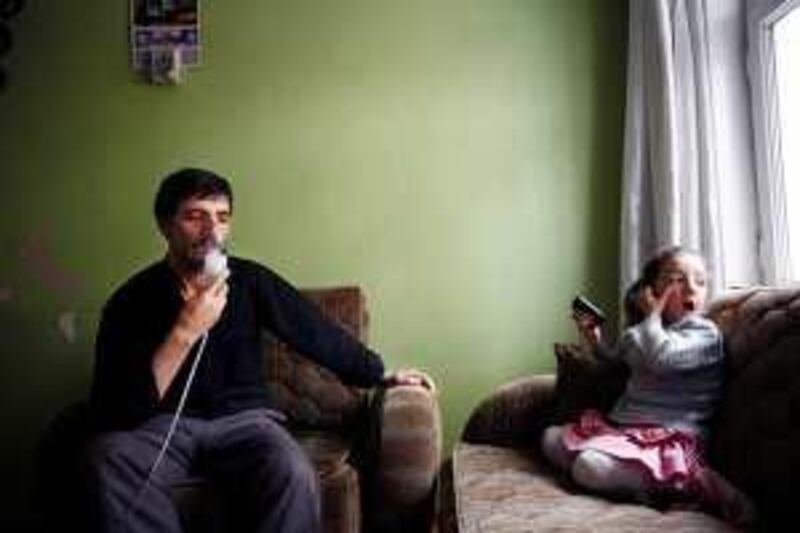ISTANBUL // At least two dozen young men have died and thousands more may be fatally ill after they were exposed to hazardous particles while sandblasting jeans in Turkish sweatshops without protective gear, campaigners say. Activists blame companies and a lack of controls by the government for exposing an estimated 20,000 people to the hazardous conditions, which trigger a deadly illness.
"Normally, this illness develops over years or decades, but in the case of our workers it takes only a few months or one or two years," Zeki Kilicaslan, a lung specialist at Istanbul University and a leading campaigner against sandblasting, told the audience of a concert organised in support of the workers in Istanbul this week. Up to 5,000 could die in the coming years as a consequence, said Elif Reyhan Han, a doctor at the Ankara Hospital for Occupational Illnesses. The hospital has sent a report concerning the issue to the labour ministry in Ankara.
About 30 people have died so far, said Ozlem Ayata, a lawyer who co-ordinates legal complaints by the workers, citing her own research and that of medical experts. The latest victim, Ruhat Yildirak, a 24-year-old worker, died on Feb 28, according to the Solidarity Committee of Jeans Sandblasting Workers, or KTID, a group campaigning for the closure of sweatshops. "Some of those who got ill had worked [in the sweatshops] for as little as three or four months," Ms Ayata said.
"In our village alone, the official number of ill people is 187, and it is 300 if you count those who did not see a doctor," one of the workers, Abdulhalim Demir, wrote in an open letter to the public, which was published in the Turkish press. "Helplessly, we wait for our death," Mr Demir wrote. The fate of the jeans workers throws a spotlight on the dark side of Turkey's spectacular economic rise in the past six years.
The country has more than doubled its gross domestic product since 2003, but the boom also saw hundreds of thousands of poor workers from rural areas drifting into such big cities as Istanbul to find jobs, often working in unsafe conditions in unregistered companies without social security or health care. Workers such as Mr Demir sandblasted jeans in workshops to whiten or "age" them on the thighs or other places, resulting in the worn look that became fashionable in denim in recent years.
In proper working conditions, the high-pressure sandblasters are used in tightly sealed cells and workers are provided with a face mask and air supply though a hose. But according to Evrensel, a daily newspaper, these safety measures are unheard of in Istanbul's sweatshops - unregulated and illegal workshops of which there are about 1,000. As a consequence, workers inhale a large amount of sand dust. The dust contains silica particles, a mineral component of sand, which can cause parts of the lungs to clog, triggering an illness called silicosis.
There is no cure. Known since the 18th century as an illness of knife grinders, miners and quarry workers, silicosis normally develops very slowly. But in the sweatshops, that process is sped up because of the huge amounts of sand dust, said Prof Kilicaslan, who is also the chairman of the small left-wing Party for Workers' Brotherhood. "Death is not certain, but it occurs in serious and very serious cases," he said. "We have 700 patients [from sandblasting] at the moment. "
Simple masks covering the nose and the mouth do not offer enough protection. Some workers have said they cough up sand, according to the KTID. One worker, Mehmet Bekir Basak, said more of those who had been exposed to the dangerous working conditions were signing up to join legal action in an effort to get compensation. "When I started this lawsuit, I was alone. Now we are many," Mr Basak said in a KTID statement.
Almost 150 workers have joined a series of class action suits against companies and authorities, who are accused of having failed to control the workshops properly, said Ms Ayata, the lawyer. But legal action is progressing slowly. There has not been a single verdict in a trial connected to silicosis, although doctors first came across the sandblasting-related form of the illness in 2004. The KTID says the pro-business attitude of the governing Justice and Development Party, or AKP, of Recep Tayyip Erdogan, the prime minister, is partly responsible for the death of the workers.
"The AKP, as the government of textile entrepreneurs, closed its eyes when the young jeans workers died one by one and threatened doctors by saying 'don't get too involved in that problem'," the group said. The textile sector is a key branch of the Turkish economy. In 2007, the last year for which complete figures are available, Turkey exported clothes worth US$14 billion (Dh51bn), giving the country a 4.1 per cent share of worldwide exports.
Authorities closed down 15 jeans workshops with sandblasters after inspections last year, Faruk Celik, Turkey's labour minister, has said, but the KTID says many are still operating. tseibert@thenational.ae






